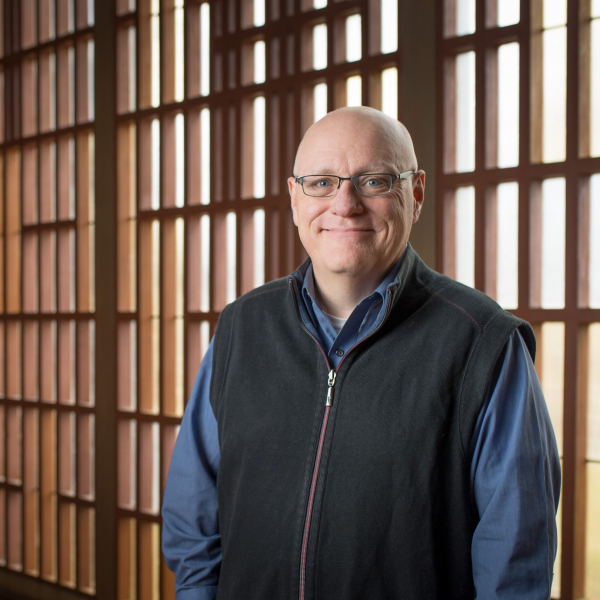Assistant Professor
About
Find Me On:
linkedinWebsite:
http://www.mhumphrey.comOffice Hours:
SP 2024: Tuesdays 3:30 - 5 p.m. & Wednesdays 1:15 - 2:45 p.m. or by appointmentRole:
FacultyPosition:
- Assistant Professor
Concentration:
- Narrative
- Listening Practice and Theory
- Mass Digital Media
Department:
- Journalism & Media Communication
Education:
- Ph.D.
Curriculum Vitae:
Biography
Michael Humphrey researches and teaches at the confluence of narrative and listening theory. As a researcher, he has recently embarked on a series of studies of "storylisteners," people whose vocations prompt them to listen for others' narratives, including healers, leaders, teachers, tellers, seekers, and more. He also researches how narratives emerge on digital platforms, from influencers of Instagram to former presidents on Twitter. He teaches graduate students communication theory and methods as well as specialty courses in narrative.
As an undergraduate journalism instructor, Humphrey teaches a wide range of classes about communicating stories to mass audiences. He has taught Online Storytelling and Audience Engagement, Media Analytics, Audience Analysis, Entrepreneurial Journalism, Ethics, Law, Advanced Reporting, and co-taught a Liberal Arts course called, "Storylistening," which will become a JMC course in the near future.
As a contributor for Forbes.com, he was one of the early journalists to feature YouTube celebrities as entrepreneurs and entertainment disruptors. His reporting and commentary were featured in the Morgan Spurlock-produced “Vlogumentary.” He has also covered social television, social video marketing, virtual and augmented reality and participatory culture.
Before receiving his M.A. at New York University, Humphrey wrote feature stories for The Kansas City Star and founded 1000 Stories, a life story writing program sponsored by KC metro area libraries that reached more than 2,000 adult students.
His writing has also appeared in Salon, National Catholic Reporter, True/Slant, The New Yorker, New York and others. Michael lives in Fort Collins with his partner Lorie Humphrey, a career counselor at the CSU College of Business.
Publications
Peer Reviewed Journal Articles
Humphrey, M. (2022) Pater for Millions: Negotiating the Collapse of a YouTube Father Persona. Persona Studies, 8(2), pp. 42-55.
Humphrey, M. (2021). Reexamining Arendt’s concept of Oikos through the lens of a YouTube Vlog. Persona Studies, 7(1), pp. 20-32.
Humphrey, M. & Gbadamosi, E. (2021). The ‘Imagined Author’: Contingent selves in an anonymous life writing subreddit. Journal of Comparative Literature and Aesthetics, 44(4), pp. 164-174.
Humphrey, M. (2020). The Narratable Self lost in a cave: Tracing hints of humanity in an Instagram trope. Storytelling, Self, Society, 16(2), pp. 225-243.
Humphrey, M. & Humphrey, L. (2020). Career Construction in volatile settings: seeking congruence in a journalist’s world today. Life Writing, 17(1), pp. 75-88.
Humphrey, M. (2018). Confession narratives and mass kinship of YouTube celebrities: A narrative rationality analysis. Interactions: Studies in Communication and Culture, 9(2), pp. 225-237.
Humphrey, M. (2017). ‘I Am In No Way This’: troll-hunters and pragmatic digital self-reference. Persona Studies, 3(2), pp. 21-34.
Peer Reviewed Chapters
Humphrey, M. (2023). Small Stories in Mass Media: Coalescent themes and tactics in Trump’s Twitter presidency. Accepted in peer review for book chapter.
Humphrey, M. (2020). The transmediated self as story: examining ‘working self’ narratives in social media. The Editorial Fund of the EAFIT University.
Keats, E. & Humphrey, M. (2018). From penning to pinning: performing personal ‘unfinished stories’ across multiple social media. Brill Publishers.
Invited Manuscripts
Humphrey, M. (2019). Has narrative found a challenge in Virtual Reality? Society for Technical Communication Intercom.
Humphrey, M. (2018). No greater than who I actually am: virtue ethics in digital life narratives. In P. Plaisance (Ed.) Communication and Media Ethics. Berlin: de Gruyter Mouton.
First Generation Story
From the time I can remember considering it, I knew college would be part of my future. Looking back now, I realize that clarity derived from needing to be part of communities that elevated the individual while also becoming more than the sum of its parts. Learning communities have been my bedrock as a human being and it is an honor to belong to this community, in the state where was I born and reared, welcoming and serving the next first generation to college.
Courses
-
JTC 500: Communication Research and Evaluation
Communication research and evaluation methodologies for assessing and improving communication in technology environments. Mainly for entering M.S. and Ph.D. students.
-
JTC 415: Communications Law
The purpose of this course is to advance student knowledge of the First Amendment and the principles of free expression in a democracy, while educating students about their related legal rights and responsibilities. This survey course also covers some of the differing systems of free expression around the world and how they compare to the system in the U.S. Students will learn about the historical trajectory of the law and contemporary legal situations and issues.
